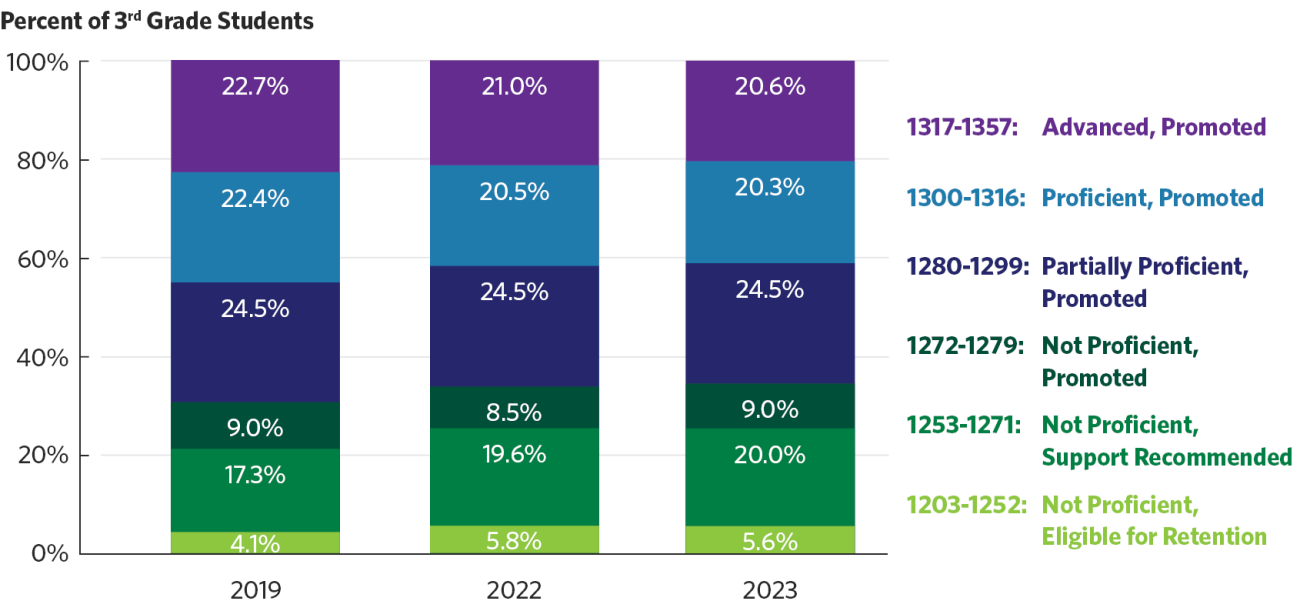Michigan third-graders still struggle with reading, more supports needed


- One-third of Michigan third-graders are less than proficient in reading; 5.6 percent are more than a year behind
- An education researcher suggests more literacy staffing and using better literacy curriculums in local schools would help
Roughly 1-in-3 Michigan third-grade students tested below state proficiency levels on reading last year. That included more than 5 percent of students who were more than a year behind in reading, triggering requirements for additional support.
Researchers from Michigan State University’s Education Policy Innovation Collaborative released the new reading data Tuesday. It reveals continuing struggles among young Michigan readers despite a state law in place since 2016 that requires districts to identify students with reading deficiencies beginning in kindergarten and get them extra help.
“These groups have stayed about the same size over time,” said EPIC’s interim associate director Tara Kilbride. “It's been a sizable proportion of Michigan's third-grade students.
“So it seems like there's support needed for a wider range as well. They might not need the same intensity of support. But it's not just these students scoring at the very bottom who are below state standards for third-grade reading.”

Bridge Michigan interviewed Kilbride to review what has and hasn’t worked about the state’s third-grade reading law and what the state can do to better improve reading proficiency for young learners. (Earlier this year, Gov. Gretchen Whitmer signed Democratically sponsored legislation that repealed that portion of the law that required students to be held back if they were a year or more behind in reading.)
Related:

This interview has been edited for length and clarity.
Q: During the past school year, roughly 5.6 percent of Michigan third-graders are more than a grade level behind their expected reading skills. What does this say about the state of education in Michigan?
This makes it clear that there's a substantial number of students in Michigan who still by the end of third grade are struggling with basic fundamental reading skills.
If you think about this group of third graders, their entire K-12 education to this point has been affected in tremendous ways by the COVID-19 pandemic, in ways that no cohort before them have.
Q: When we're looking at the third-grade reading law, it was first passed in 2016. Some of the law has been repealed, but one of the positive things it created and continues to have is this requirement that students who are struggling the most qualify for support services such as one-on-one tutoring to help catch them up. What can you tell us about the success of those supports?
(For) the last three years, we've done annual surveys of educators and administrators in Michigan schools about their perceptions of the law and these different supports, how well they're working.
And these other types of supports, aside from retention (making students repeat third grade), where we've been consistently hearing positive feedback, that educators find these to be helpful, that they're implementing them to a high degree for the students that need them in their classrooms, and that they're seeing improvement.
Do we have statewide data on how many students are receiving these types of services?
There's statewide data on the number of students who are identified as having a reading deficiency. So that's based on whichever diagnostic assessments their districts choose. But they do that testing in kindergarten through third grade.
And then the students who are identified at the beginning of each of those kindergarten through third grade years have to get some sort of additional literacy instruction or other interventions in advance of that final end-of-third-grade testing point.
Do we have any specific data on the people who test more than a grade level behind but then are moved on onto fourth grade, in terms of what types of interventions they're getting?
We don't know what specific interventions they received from that list of requirements in the law for either the students who were retained or who score in the retention-eligible range but end up being promoted.
There are requirements for what those students must receive but that's not something that's explicitly collected.
What do we still need to learn about these interventions? Or what can we be doing to ensure that more students are (reading) on grade level?
One thing that we don't know a lot about is how schools and districts are screening to identify the students who need support earlier on. The districts can choose from an extensive list of screening assessments.
Some can use multiple and they can determine their own criteria. Even if districts are using the same assessments, they can use their own criteria to decide what kinds of scores on those assessments would constitute a reading deficiency and warrant interventions.
So we don't know a lot about what districts are using specifically and how accurately they're identifying the right students who need support.
And then, after they identify students, we know a little bit about when they're receiving support. So the only data that's collected or reported through the Michigan student data system just tells us for those identified students: Did they get support during the school day, before the school day, after the school day or over the summer? But we don't get anything more detailed than that.
So is it fair to say we do not know how many students after they take the third-grade M-STEP end up receiving additional literacy supports?
That's true, not at the state level, that's not collected, at least not to my knowledge.
What more can state lawmakers and school districts do to ensure more students are reading on grade level? It seems there's plenty of money being invested in the effort, but is it a matter of more money, more people to fill these jobs? What do we need?
Human capital has definitely been a challenge that has prevented some districts from being able to implement interventions the way they were intended.
A lot of districts have expressed that they've gotten funding to hire early literacy coaches to help train their teachers in instructional practices for early literacy. But they couldn't find enough coaches to meet their needs. So that's certainly something that has prevented them from being able to implement those supports the way they would like.
We've also found that there's a huge amount of variation in the types of literacy curricula that teachers are using. Variation across districts and schools, but even within a school, teachers use all sorts of different curricula and resources. And a lot of the curricula that we've seen reported are either not rated in national studies or rated poorly.
So in some cases, there's evidence that these aren't particularly effective tools that we know a lot of teachers are using. So perhaps more guidance and availability of curricula and other resources that have been demonstrated to be effective for … helping students meet early literacy (or) get the skills that they need in early literacy.
Michigan's not unique in that there are other states that have also implemented similar third-grade reading laws. What can we learn from what other states have done?
A lot of the empirical evidence about these types of policies has come from Florida. And what we've seen is that there's been either mixed effects of retention or little effect at all in some cases.
Where we have seen impacts of third grade retention, they've generally been short term and kind of faded out where they don't continue, students don't continue to show those benefits years after retention. It's more of a short-term change that then kind of fades out.
Michigan lawmakers repealed the portion of the law that deals with retention. And we know from previous research from EPIC, that districts were already holding so few students back. So what can we learn from this experiment with third-grade retention?
The way Michigan's law was structured, it gave educators, parents administrators say in whether or not students actually were retained in the end, and we saw even in the years before that requirement went into effect that educators were expressing skepticism about how effective that would be, as the same with administrators.
We saw a lot of people expressing concerns that the retention component was not only not going to help students, but cause an unnecessary level of stress in the community.
So it wasn't surprising to see that a lot of districts and teachers took the steps to ensure that the students were promoted to fourth grade if they felt that that was in their best interest. And that seems to be the case more often than not for the students who scored below the cutoff.
What if anything, can we learn from Michigan's overall experiment with its third-grade reading law?
Going on the experiences and expertise of educators and administrators in our schools, the interventions that seem to really be working are things like more time spent with literacy instruction, a greater focus in their classrooms on that, as opposed to other subjects. More small-group and one-on-one literacy interventions and supports.
Ongoing progress monitoring assessments have also been helpful to educators to be able to identify and address students who are struggling with literacy skills earlier on.
They haven't been as optimistic about read-at-home plans or summer reading camps.
See what new members are saying about why they donated to Bridge Michigan:
- “In order for this information to be accurate and unbiased it must be underwritten by its readers, not by special interests.” - Larry S.
- “Not many other media sources report on the topics Bridge does.” - Susan B.
- “Your journalism is outstanding and rare these days.” - Mark S.
If you want to ensure the future of nonpartisan, nonprofit Michigan journalism, please become a member today. You, too, will be asked why you donated and maybe we'll feature your quote next time!


